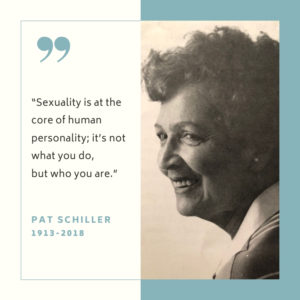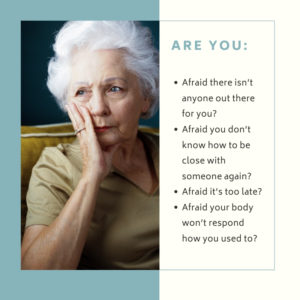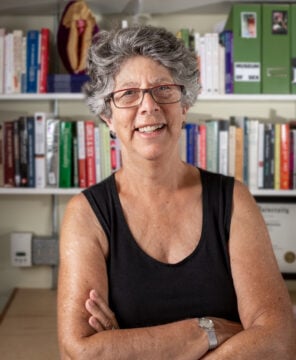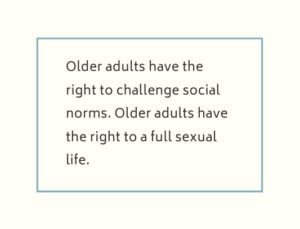 Pat Schiller was at a Legal Aid office working with matrimonial disputes in the 1950s and became disillusioned. She realized that most couples needed counseling not litigation. She went back to school and began a long and impressive career as a sexuality educator. Her comprehensive vision of sexuality education reminds us that sexuality is not an act but a state of being and went on to become a founder of the American Association of Sexuality Educators, Counselors and Therapists (AASECT). She died at 104 after a wonderful life as an educator, author, wife, and mother.
Pat Schiller was at a Legal Aid office working with matrimonial disputes in the 1950s and became disillusioned. She realized that most couples needed counseling not litigation. She went back to school and began a long and impressive career as a sexuality educator. Her comprehensive vision of sexuality education reminds us that sexuality is not an act but a state of being and went on to become a founder of the American Association of Sexuality Educators, Counselors and Therapists (AASECT). She died at 104 after a wonderful life as an educator, author, wife, and mother.
As a Certified Sexuality Educator, I too employ a comprehensive approach to my work in sexuality. I talk often about pleasure – that sex is a right to be enjoyed with consent, especially for older adults. That is the ideal. Yet, many older adults often derail themselves from sexual pleasure with feelings of shame, fear, and guilt.
1. SHAME. Let the sun shine in.
Many of us, when we consider the possibility of pleasure in the form of love, sex and intimacy in our lives as older adults, start to feel shame. Remember how simple it was to find pleasure when we were very young? Kids find pleasure in the simplest ways — jumping into a pile of leaves, splashing in the water, making mud pies. Many of us find ourselves longing for those simple pleasures as we age. And when we do try to include pleasure, particularly sexual pleasure, some of us feel shame. It’s as if we don’t have the right or don’t deserve it.

As we age, we are bombarded with messages that stand in the way of our finding pleasure. From family, peers, and even ourselves. Someone might ask you, “Why do you need sex in your life at this late age?” And you might start wondering if it isn’t enough that you had sex when you were younger. Those who feel shame about their bodies, especially women, are more vulnerable to relationship difficulties. Is it shameful to seek out a new partner after your spouse is gone?
And if you’ve been in a caretaking role for your parents, your children, your partner (or all of the above), perhaps it’s time to ask yourself: When is it OK to take care of yourself? Shame exists best in the darkness. If you’ve felt ashamed to even think about a new relationship (let alone having sex), remember that you have the right to shed some light on pleasure. Let the sun shine in!
2. FEAR. Cold feet, exhaustion, chest pain, sweaty palms.
These are part of the physiology of fear. When we consider what we’re most afraid of, the idea of having sex (after many years of not having any sex) may evoke some very strong fears.

If you’re afraid that you might fail at the possibility of love or sex, you are not alone. Most of us have fears about intimacy, especially as older adults. In one of my classes, a woman told me she was afraid her body didn’t look beautiful anymore. I suggested she strike the word beautiful and insert the word young. A man recently told me he was fearful that he might not be able to perform sexually. I suggested other positions like ‘outercourse’. With wrinkles and sags and loss of flat abs, you may be afraid you’re not fit for a new fling or infatuation. Current research has shown that the way you feel about your body often has very little to do with what others see. If you have any of these fears, you are not alone. Remember that sex happens when we’re lying down (at least for some of us at later ages) and not much is sagging when you’re horizontal.
4. FEELING GUILTY. Let’s leave guilt in the courtroom.
Guilt is a powerful engine of social conduct. Having been found guilty by a judge conveys a sense of justice. Wrongs have been righted and justice has been done. At least that’s what happens on television.
Most of us wish for a state of balance when starting a new relationship, but instead we are often fueled with images of guilt. Especially when we want to reach for passion or sex. Feeling guilty because you’ve been without a partner for years and now want to see what it’s like to find joy with another person? Feeling guilty because you haven’t waited the requisite number of months or years since your partner passed? Or feeling guilty because you want to start introducing sex into your life with no strings attached?

Guilty feelings can be redirected. Why do we feel guilty for taking pleasure? When we reach for pleasure, is it a “guilty” pleasure? What’s wrong with eating chocolate, staying up too late, or having passionate sex? We can counteract those feelings of guilt by offering loving kindness to ourselves. Kindness that speaks to our hearts. Wouldn’t it be unbelievably kind if we could replace our guilt with a simple phrase like: I am good, I deserve pleasure, I choose joy. If you’re feeling guilty for wanting to bring goodness, pleasure, and joy back into your life, perhaps it’s best to get rid of the judge and offer some loving kindness.
4. INNER CRITICS. We can imagine new possibilities.
If you’re like most of us, your naked body can bring out the harshest, most sinister, inner critic. You might wonder who’s going to be interested in you when they see your nakedness, hair loss, and wrinkles?
And if you haven’t had sex in a while, perhaps even the thought of being in bed with someone can invoke your inner critic. What if you start kissing someone and want to have sex but you’re concerned about your body? Feeling concerned about your body when you’re thinking about having sex can put a damper on your sexual and intimate experience.
Think about what your body has done for you over your lifetime. What your hands have written or built or designed. What changes you’ve made. What road races (literally and metaphorically) you’ve run. What feats you’ve accomplished. Your body has been there for you for all these years. We’re so often focused on what needs fixing or what is wrong. Or how we’re not what we used to be. We often need reminders to quell those inner critical voices. Remember that adage about being “old and wiser”? Current research indicates older adults are sexual well into their 80s. Older adults of all sexual orientations continue to be sexual as they age. You can soften those inner critics when you tap into your older body’s sexual wisdom.
Enjoy what your aging body has to offer. Imagine new possibilities. Older adults have the right to challenge social norms. Older adults have the right to a full sexual life and leave those feelings of shame, fear, and guilt aside. Enjoy the moments of shared connection through the sexual wisdom of the older body.
WATCH: Is it OK for Grandma to have sex?
Dr. Jane Fleishman, a Sexuality Educator joins LTC Heroes to talk about the importance of Sexuality Education in senior care and the process of hiring an educator for your facility.
References
DeLamater, J. (2012). Sexual expression in later life: A review and synthesis. Journal of sex research, 49(2-3), 125-141.
DeLamater, J., & Moorman, S. M. (2007). Sexual behavior in later life. Journal of Aging and Health, 19(6), 921-945.
Fleishman, J. M., Crane, B., & Koch, P. B. (2019). Correlates and Predictors of Sexual Satisfaction for Older Adults in Same-Sex Relationships. Journal of homosexuality, 1-25.
Koch, P. B., Mansfield, P. K., Thurau, D., & Carey, M. (2005). “Feeling frumpy”: The relationships between body image and sexual response changes in midlife women. Journal of Sex Research, 42(3), 215-223.
Langer, N. (2009). Late life love and intimacy. Educational Gerontology, 35(8), 752-764.
McKee, K. J., & Gott, M. (2014). Shame and the ageing body. In Body Shame (pp. 89-103). Routledge.


 Dr. Jane Fleishman
Dr. Jane Fleishman
